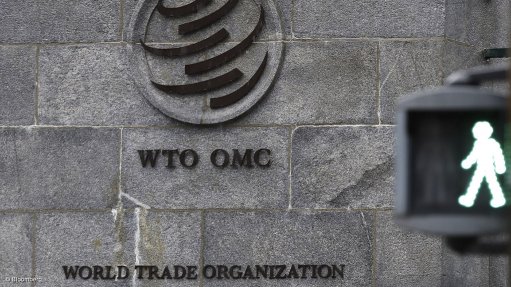Quality Inspection for the Food and Beverage packaging lines
This article has been supplied as a media statement and is not written by Creamer Media. It may be available only for a limited time on this website.
Quality inspection is critical in all manufacturing and packaging lines, especially in the Food and Beverage sector. Being able to catch a defective product before the products are shipped to customers in retail can bring significant savings in both time and money, preventing expensive product recalls, wasted production and potentially expensive legal costs.
For perishable products, quality inspection of the packaging is also critical. An unreadable barcode or an incorrect expiry date could result in perfectly good products being recalled and discarded. And increasingly strict legislation is making clear marking a top priority for all types of product. In 2008 the Consumer Protection Act was implemented to prevent exploitation or harm to consumers by regulating the way in which businesses interact with consumers, and market their products and services. Packaging and labeling must now adhere to certain standard. Food Labelling Regulations (R146) was also introduced to standardize labeling and to ensure all food and beverage manufacturers adhere to the same standards laid out.
As production lines become ever more automated, inspection and quality control also need to be more automated. Automated systems can improve a line’s effectiveness, by performing tasks quickly and accurately. However, the real benefits only truly materialize when ‘smart’ automation is implemented, utilizing such features as smart data. When this is applied to vision inspection systems, defects can be spotted and dealt with swiftly with minimal impact to the line. A smart vision inspection system can make any production line more efficient and less wasteful, both in terms of produce and down time.
The importance of quality control
All production lines face challenges regarding inspection and quality control. But in the Food and Beverage industry, mistakes must be avoided at all costs.. The effects of defects reaching the public domain can be far-reaching, affecting everything from consumer health to brand confidence.
Governments also want to protect their citizens, and as a result, are enforcing ever tighter restrictions on package markings, especially in the food and pharma sector. For example, in South Africa R146 was implemented to ensure that the food and beverage manufacturers in SA complies with the international standards.
All present and correct: Omron system solution
Omron systems cover all parts of the production line, including quality inspection. Whether providing a complete system solution or a partial upgrade to an existing system, each component is geared towards ensuring the highest quality control. For inspection and quality control Omron’s very compact visual inspection units monitor production in real time and respond instantly to any defect.
Data sent from the vision system is processed locally and sent via the cloud for powerful analysis that allow the system to take appropriate actions. The system is totally interlinked, with the improved connection between machines in a manufacturing line delivering more accurate quality control and higher efficiency. If any error is detected, the system can often compensate automatically, allowing production to continue unaffected. Omron’s smart automation solutions are very fast and possess lots of processing power, yet they are easy to use. This combination of speed, intelligence and user-friendliness delivers the most effective inspection and transparent quality control.
Following the rules
For an inspection system to be able to make smart decisions, it needs to collect data from a sensor, such as a vision camera. Vision cameras can be set up to monitor different aspects of the product, perhaps to check for imperfections, or to check labels for misprints or missing information. Powerful processing then analyses this data to monitor the process, comparing actual results with expected results. If any problems are found, the system follows programmed rules on how to respond to any changes. It may even be able to deal with the matter automatically, but in every case an operator will always be informed for correct process management and in case any additional action that might be required.
The more data there is, and the more processing performed, the ‘smarter’ the machine can be to help keep manufacturing lines running longer, with less downtime and higher productivity. All data is logged by the system and is typically stored in the cloud. This also helps meet regulations as operations can be later reviewed for auditing purposes.
Flexibility, now and in the future
In addition to catching production errors and reducing waste, a further advantage of an effective inspection and process management system is flexibility. By combining vision, motion, control, safety, and robotics, all in a single management system, such as Omron’s Sysmac Studio, production lines can readily accommodate short production runs and adapt to market demands. Line set-ups can be changed quickly for new production runs, and the recognition pattern for quality inspection can be updated easily in the software. This ensures different variants or even different products are produced and packaged correctly.
The system is also future-proofed as it can be easily adapted to accommodate any changes to regulations. Therefore, manufacturers do not need to worry about what they might need to do to their production lines to meet future regulations. All that is required is to rollout a new firmware update for the existing solution.
Comments
Press Office
Announcements
What's On
Subscribe to improve your user experience...
Option 1 (equivalent of R125 a month):
Receive a weekly copy of Creamer Media's Engineering News & Mining Weekly magazine
(print copy for those in South Africa and e-magazine for those outside of South Africa)
Receive daily email newsletters
Access to full search results
Access archive of magazine back copies
Access to Projects in Progress
Access to ONE Research Report of your choice in PDF format
Option 2 (equivalent of R375 a month):
All benefits from Option 1
PLUS
Access to Creamer Media's Research Channel Africa for ALL Research Reports, in PDF format, on various industrial and mining sectors
including Electricity; Water; Energy Transition; Hydrogen; Roads, Rail and Ports; Coal; Gold; Platinum; Battery Metals; etc.
Already a subscriber?
Forgotten your password?
Receive weekly copy of Creamer Media's Engineering News & Mining Weekly magazine (print copy for those in South Africa and e-magazine for those outside of South Africa)
➕
Recieve daily email newsletters
➕
Access to full search results
➕
Access archive of magazine back copies
➕
Access to Projects in Progress
➕
Access to ONE Research Report of your choice in PDF format
RESEARCH CHANNEL AFRICA
R4500 (equivalent of R375 a month)
SUBSCRIBEAll benefits from Option 1
➕
Access to Creamer Media's Research Channel Africa for ALL Research Reports on various industrial and mining sectors, in PDF format, including on:
Electricity
➕
Water
➕
Energy Transition
➕
Hydrogen
➕
Roads, Rail and Ports
➕
Coal
➕
Gold
➕
Platinum
➕
Battery Metals
➕
etc.
Receive all benefits from Option 1 or Option 2 delivered to numerous people at your company
➕
Multiple User names and Passwords for simultaneous log-ins
➕
Intranet integration access to all in your organisation


















